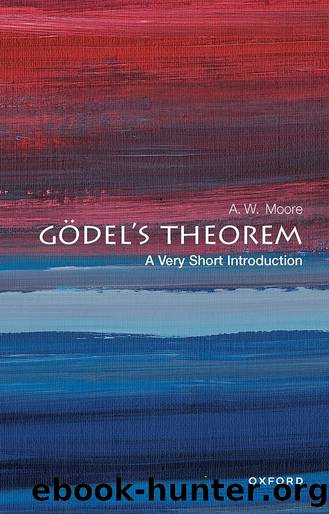Gödel's Theorem by A. W. Moore

Author:A. W. Moore [Moore, A. W.]
Language: eng
Format: epub
ISBN: 9780192663580
Publisher: OUP Oxford
Published: 2022-09-12T00:00:00+00:00
An axiomatization can involve infinitely many axioms because, although the set of axioms has to be decidable, decidability doesnât entail finitude.
Decidability doesnât entail finitude. It nevertheless involves finitudeâin as much as, when a set of statements is decidable, there is a finite account of what it takes for a statement to be a member of the set; or, equivalently, there is a finite description of the relevant algorithm. And indeed this is why a decidable set of axioms always corresponds to a single basic principle or to a finite set of basic principles, as illustrated in the example above. (This is the subtlety to which I referred in Chapter 1. It is because there is a corresponding basic principle or finite set of basic principles that the statements in a decidable set are fit to serve as axioms at all.)
Something else illustrated in the example above is the idea of a property that is expressible in a language for arithmetic. This leads to the next definition.
Arithmetical predicate: An arithmetical predicate is defined as an expression in a formal language that expresses a property of natural numbers.
To amplify. An arithmetical predicate Î in a formal language â must contain, as well as symbols from â, one or more occurrences of the ellipsis â_â. When each of these occurrences of â_â is replaced by an expression e in â that stands for a natural number, what results is a statement s in â that has e as its grammatical subject. (Note that if there is more than one occurrence of â_â in Î , then each of them is to be replaced by the same expression: the resultant statement s will then have a grammatical subject that occurs more than once in it.) Î can be thought of as picking out some property that any given natural number may or may not possess. It applies to any natural number that does possess the property; it fails to apply to any that does not. If it applies to the natural number that e stands for, then the statement s that results when each occurrence of â_â in Î is replaced by e is true; if it fails to do so, then s is false.
Examples of arithmetical predicates (again, couched here not in their pristine form, but in a mixture of formal vocabulary and English, together with some familiar abbreviations) are:
⢠_ is prime;
⢠10 < _ < 15;
⢠_ is the sum of four squares;
⢠_ < 2 _
(this was the example considered above);
⢠_ is odd and _ is divisible by 4;
⢠.
Download
This site does not store any files on its server. We only index and link to content provided by other sites. Please contact the content providers to delete copyright contents if any and email us, we'll remove relevant links or contents immediately.
The Infinite Retina by Robert Scoble Irena Cronin(6249)
Harry Potter and the Cursed Child: The Journey by Harry Potter Theatrical Productions(4506)
The Sports Rules Book by Human Kinetics(4386)
Molly's Game: From Hollywood's Elite to Wall Street's Billionaire Boys Club, My High-Stakes Adventure in the World of Underground Poker by Molly Bloom(3536)
A Knight of the Seven Kingdoms by George R R Martin(3371)
How To by Randall Munroe(3113)
Flowers For Algernon by Daniel Keyes(3110)
Quidditch Through the Ages by J.K. Rowling(3100)
Quidditch Through the Ages by J K Rowling & Kennilworthy Whisp(2971)
Stacked Decks by The Rotenberg Collection(2883)
Quidditch Through the Ages by Kennilworthy Whisp by J.K. Rowling(2860)
Quidditch through the Ages by J. K. Rowling(2793)
776 Stupidest Things Ever Said by Ross Petras(2780)
Quidditch Through The Ages by J. K. Rowling(2765)
Ready Player One: A Novel by Ernest Cline(2724)
What If?: Serious Scientific Answers to Absurd Hypothetical Questions by Randall Munroe(2704)
Beautiful Oblivion by Jamie McGuire(2607)
The Book of Questions: Revised and Updated by Gregory Stock Ph.d(2572)
Champions of Illusion by Susana Martinez-Conde & Stephen Macknik(2451)
